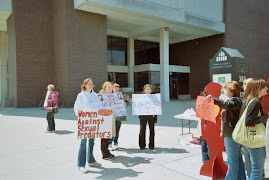Eyeing sex predators: Bill tweaks designation process justifiably
Clint Talbott, for the editorial board
Sunday, March 16, 2008
Sean Christopher Jackson says two teen-age girls consented to have sex with him. His father says Jackson pleaded guilty to attempted sexual assault to avoid a possible life sentence. There was no sexual offense, the father says. Sean Jackson, he maintains, was just "an immature teen-ager -- a stupid kid."
The two victims, who were 14 and 15 at the time of the assaults, say Jackson raped them. Jackson lost his right to feign innocence when he pleaded guilty. He spent three years in prison -- a sentence that reflects a judge's conviction that Jackson committed a serious crime.
In a parole-board hearing, Jackson denied his guilt, as sexual offenders often do. Because he denied his crime and showed other key risk factors, the parole board labeled him a "sexually violent predator," a designation designed to warn society of the sex criminals who are most likely to reoffend.
Sexual convicts, their friends and their well-paid advocates say the SVP label is inflammatory and unfair. Their argument should be weighed in light of the evidence -- which demonstrated in court that they committed grievous sexual offenses on innocent victims and against the people of Colorado.
The term "sexually violent predator" inspires a great deal of fear, Ingrid Bakke, a former sex-crimes prosecutor, told the Camera recently. "That does a lot in terms of scaring people and making the offender equally afraid of more repercussions when tagged," said Bakke, now a private defense attorney.
"And I think we have yet to see if it works or not."
Julie Brooks, a spokeswoman for the Boulder Police Department, offered a similar view. "It's such a misnomer," she told the Camera. "There can be no violence involved (and people can still be) labeled."
Brooks should know that "crimes of violence," including various forms of sexual assault, are carefully defined by state law. A victim need not be physically battered to have suffered a crime of violence. Sexual assault, which involves the overcoming of the victim's free will, does profound, lasting and very real violence to her psyche. The law appropriately recognizes this damage as violence.
Sex offenders and their sycophants will never recognize that truth, but the rest of society should. All that being said, there is a legitimate critique of the "sexually violent predator" tag: The designation can be made by a parole board if a judge fails to make a determination. Unlike a court, a parole board meets in secret, without the convict's defense attorney.
Rep. Dianne Primavera, a Broomfield Democrat, has sponsored a bill that would direct the sentencing court to administer a sexually violent predator assessment. Primavera's legislation, House Bill 1247, has cleared the House and Senate.
"This bill ensures that sexually violent predators are assessed at the right place at the right time by someone with the right skill level," Primavera said in a statement. "It will help guarantee offenders get the proper treatment so they don't fall through the cracks and offend again once they are released."
There is no perfect system of identifying, labeling and tracking the worst of the sexual sociopaths in our midst. Primavera's bill will not satisfy those who want to claim innocence after admitting guilt. Nor will it ensure that all violent predators are so labeled. But it is a defensible step toward more consistency and rigor in pursuit of public safety.
Clint Talbott, for the editorial board
Hungry Wolves
-
This world really is sick and diluted with power hungry wolves who devour
any thing in their path.
As I look for the outcome of so many missing Childre...
2 years ago



No comments:
Post a Comment